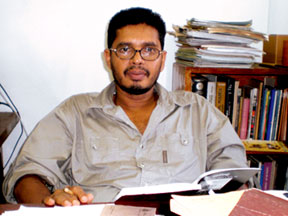Will new left challenge the present world order?

In a world of political hegemony and dominance where the strong
overpower the weak, are you one of those that subscribe to the theory,
"so what? that's nature. It happens in the jungle as well."
Yet, before your very presence should someone overpower you and rape
your wife would you still maintain, "So what? that's the jungle's law".
|

Dhamma Dissanayake |
Surely, you wouldn't. Instead, the law courts would be your refuge to
punish the strongman that weakened you. Thus, the discriminatory
application of the jungle's rule to suit whatever is our convenience. As
one moves away from the conceptual arena to pragmatism seeking justice,
is it possible to act in like manner should your employer earn millions
and throw away a pittance at you.
Levelling that inequality is not the court's concern - its redress
being only in non-receipt of remuneration. Yet, welfarism, democracy and
human rights all part of liberal politics was to mitigate social
inequality - seemingly unthinkable worldwide except in social
democracies.
Why then do liberal democracies facilitated with a free ride into
unjust governance result in large-scale social frustration.
No competitor
Contemporary liberal politics believably has no formidable competitor
unlike in the fifties and sixties. The world then was relatively
enlightened, says Colombo University's senior Professor in History
Dhamma Dissanayake. What's more, in that political enclave, intellectual
trends were evident unlike today. Polarisation of Soviet politics broke
that trend of intellectual discourse that raised issues on equality,
equity, human dignity, non-exploitation, art and tradition.
From liberal politics emerged the black movement, feminist movement,
the French students' struggle not to forget new trends in music like for
instance the Beetles and Ragae and so on. Likewise the Cuban and Chinese
revolutions and the communist trend was the outcome of Soviet and
Communist party politics.
Coming in between liberal and communist politics was the non-aligned
movement. Thus an equilibrium in world politics set in.
Since the two systems of non-alignment and communist party have
become defunct, what's more in the absence of intellectuality, current
liberal politics is riding on a crest wave and continues that way with
no formidable opposition. "However the danger lies in the fact that
liberal politics is based on ignorance," said Dhamma Dissanayake and
continued," we must not forget that it was the intellectual trend of the
50s and 60s that brought in relatively better world politics. He
believes world politics today to be polluted by liberal politics and its
time an alternative is found because of the anarchy setting in.
The three trends of earlier times helped keep nation state boundaries
which have collapsed after liberal politics. While capitalism is king in
the global economic system, the US is king in the world's political
stage.
Illusion
The illusion of stability projected by liberal politics in reality
has brought in more and more instability. Transparency, rule of law,
human rights, accountability, good governance all these remain only as
labels. The UN continues to be a conceptual world body - needless to say
the ineffective WTO, IMF and WB. How far have these world bodies been
successful in bringing world peace? If we study state by state
performance, only concepts remain while in reality what exists is
anarchy in the absence of rule of law.
While global political anarchism has been the result of a lack of
good governance and rule of law, economic anarchism has brought in much
inflation never mind the social anarchism arising out of myth and
violence.
Listening to Dissanayake's delivery, one could deduce how liberal
politics based on ignorance, devoid of intellectually is more of an
emotional kind. For instance take the world's super power - the US - its
attitude towards other countries. Bush apparently goes hammer and tongs
in dealing with other nations. Charged with emotion, he is into
decisions not of a rational/intellectual nature.
US decisions on Vietnam, Iraq, Afghanistan and others displays
sufficiently the illogical thought trend of liberal politics not to
forget the strife stricken countries in the Asian/African region. Very
recently Benazir Bhutto's assassination inter-alia is a glaring example.
However, the good news is an emerging trend from Latin American
countries, hopefully a formidable challenge to current liberal politics.
This new Republicanism of Brazil's Lula de Silva and others is expected
to emerge from within the nation state.
Mr. Dissanayake also warned, "without such alternative to break the
liberal monopoly, certainly a warped mentality could set in where
intense feelings towards race, religion, caste and region would be
widespread. It's already there, but very likely to worsen in the
future."
Though Mr. Dissanayake's argument is reason based, whether the
alternative he sees of a new left entry would overpower the sense based
materialistic grandeur coming off liberal politics is still to be seen.
In the fall of the communist bloc is evidenced how strong and successful
sensory needs and perceptions could be over what is intellectual,
rational and emotion free which the leftists had to their advantage.
Yet they themselves quite overawed by the liberal market yielded to
the sensual market economy arising out of liberal politics which if it
is to survive needs more and more divisiveness, chaos and mayhem - a
prediction coming from Mr. Dissanayake himself of stronger bondage into
caste, race, religion and what not.
The leftists' realisation of an intellectual base of a levelled
playing field is doubtful as humans are more sense prone into emotional
instability hankering only after whatever material gains only the
liberal market could offer. There is little doubt whether even the
leftists themselves are alien to this weak zone.
[email protected]
|
